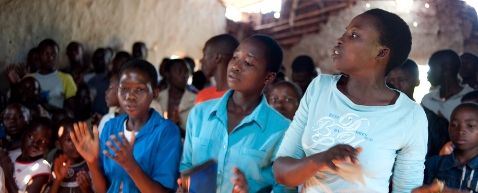Key Causes

“ Go therefore and make disciples of all nations, baptizing them in the name of the Father and of the Son and of the Holy Spirit, and teaching them to obey everything that I have commanded you. And remember, I am with you always, to the end of the age.”
God brings hope and healing to a broken world through local churches.
CBM helps equip and empower Christian congregations to live out God’s calling with their words and actions so that the love of Christ is shared in their communities. From Latin America to Asia and from the Middle East to Africa, we are walking alongside local churches so that we can participate in gospel-led transformation wherever we are.
- Providing theological education through scholarships and seminary support
- Offering leadership development and pastoral training to partner churches
- Supporting missionaries and church planting initiatives
- Providing Integral Mission workshops
- Supporting churches as they gain knowledge and build capacity in community development

“ How does God’s love abide in anyone who has the world’s goods and sees a brother or sister in need and yet refuses to help?
Communities around the world continue to be impacted by natural disasters like floods, earthquakes, hurricanes, and fires, as well as conflict, violence, and war.
In times of crisis, the local church has a special opportunity to demonstrate the gospel. They are the hands and feet that enable us to reach out to those who are suffering and provide hope. By being embedded in the crisis community, they are better able to understand the contextual needs, and provide sustainable solutions.
When emergencies strike, CBM works with local churches and our global Baptist partners’ network to respond to the unique needs of each community. This may mean addressing:
- Physical impacts such as injuries and illnesses, and lack of access to food and clean water
- Economic impacts such as unemployment and damaged infrastructure or lack of housing
- Social impacts such as loss of community and/or family structures
- Psychological impacts such as PTSD (Post-Traumatic Stress Disorder) and trauma
Together, we respond quickly to provide immediate assistance and long-term support to those who most need it.

“ He has told you, O mortal, what is good; and what does the Lord require of you but to do justice, and to love kindness, and to walk humbly with your God?”
Justice is about restoring broken relationships. It starts with a recognition of our own brokenness, but it doesn’t end there. Individuals, social frameworks, and economic systems alike need God’s restoration to bring about what is equitable and just.
Everyone deserves dignity. We are all created by God, and we derive our dignity from our Creator. Christ died for us in order that we might be reconciled to God. This reconciliation means we can partake in his abundant blessings be it physically, socially, or spiritually.
Righting wrongs is too limited a definition for what biblical justice points us toward, namely, God’s restoration of all relationships – political, religious, social, or economic. We are invited to be participants in making these systems whole and healthy.
- Peace and reconciliation training
- Psychosocial support and integration for marginalized communities
- Women’s literacy
- Restoring ecosystems
- Job skills for recovering addicts
- Skills training for widows and single mothers
- Equipping women in leadership

“ But Jesus said, ‘Let the little children come to me, and do not stop them; for it is to such as these that the kingdom of heaven belongs.”
Every child should have the opportunity to reach their full, God-given potential. Every child should have the right to protection, education, health care, shelter, and good nutrition.
Jesus has a very special place in his heart for children. Yet hundreds of millions of children live in extreme poverty, have little to no access to food, safe water, or sanitation, and struggle to survive amid the complex issues of the world today.
Through our local partners, we are changing the story for kids at risk! When children are cared for spiritually, physically, and emotionally, they can help build a brighter future for themselves, their families, and their communities.
- Supporting vulnerable and traumatized children
- Health supports and mentorship to empower girls
- Empowering youth through sports
- Education and tutoring
- Support for orphans and street children

“ I have come that they may have life, and have it to the full.”
Poverty comes in many forms and results in broken relationships (with God, ourselves, others, and the rest of creation.) It manifests itself in various ways economically, socially, politically, and even within religious systems. Marginalization in society, lack of access to education and/or healthcare, or living in unsafe/unhealthy environments are all types of poverty which contribute to the more familiar definition of struggling to live on less than $2.50 a day. CBM works with our partners to bring about sustainable solutions to address issues surrounding food security, skills to improve employability, or strategies for good health and spiritual well-being.
Through our partner churches, we come alongside people to help them overcome the challenge of poverty and work to bring about whole-life transformation by addressing the unique needs of each person and community.
- Food security, sustainable agriculture, and creation care
- Job skills training and economic empowerment
- Addiction recovery
- Disease prevention and improved health support